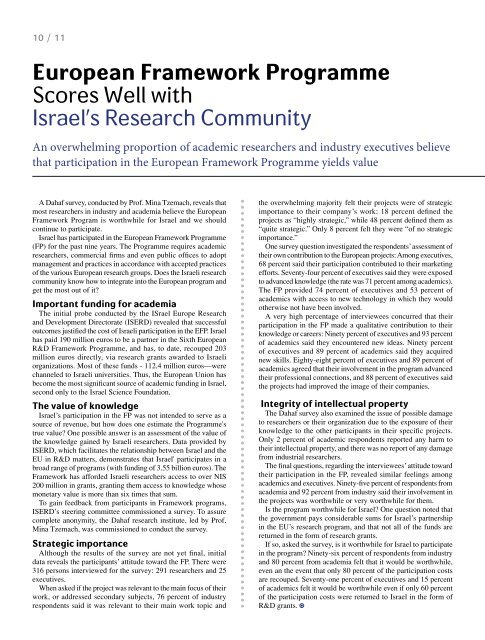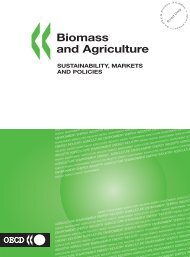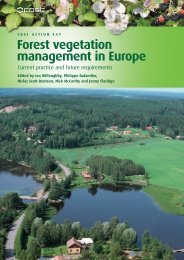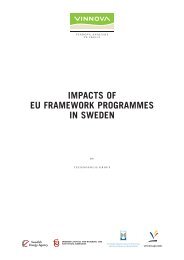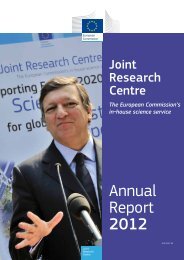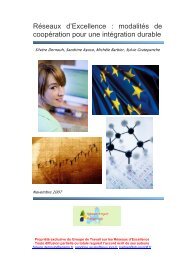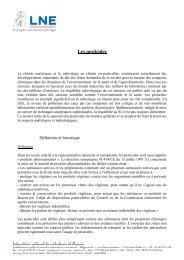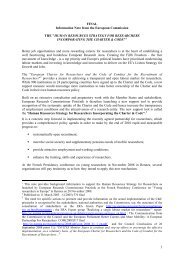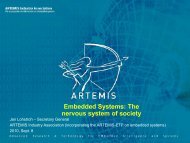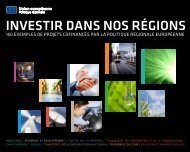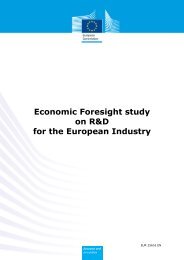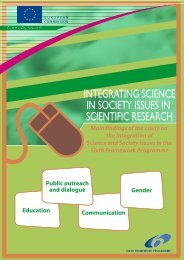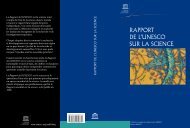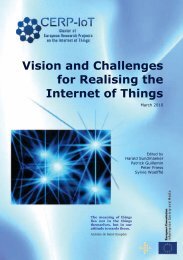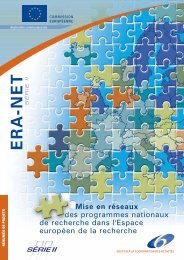Télécharger le document - Eurosfaire
Télécharger le document - Eurosfaire
Télécharger le document - Eurosfaire
Create successful ePaper yourself
Turn your PDF publications into a flip-book with our unique Google optimized e-Paper software.
10 / 11<br />
European Framework Programme<br />
Scores Well with<br />
Israel's Research Community<br />
An overwhelming proportion of academic researchers and industry executives believe<br />
that participation in the European Framework Programme yields value<br />
A Dahaf survey, conducted by Prof. Mina Tzemach, reveals that<br />
most researchers in industry and academia believe the European<br />
Framework Program is worthwhi<strong>le</strong> for Israel and we should<br />
continue to participate.<br />
Israel has participated in the European Framework Programme<br />
(FP) for the past nine years. The Programme requires academic<br />
researchers, commercial firms and even public offices to adopt<br />
management and practices in accordance with accepted practices<br />
of the various European research groups. Does the Israeli research<br />
community know how to integrate into the European program and<br />
get the most out of it?<br />
Important funding for academia<br />
The initial probe conducted by the ISrael Europe Research<br />
and Development Directorate (ISERD) revea<strong>le</strong>d that successful<br />
outcomes justified the cost of Israeli participation in the EFP. Israel<br />
has paid 190 million euros to be a partner in the Sixth European<br />
R&D Framework Programme, and has, to date, recouped 203<br />
million euros directly, via research grants awarded to Israeli<br />
organizations. Most of these funds - 112.4 million euros—were<br />
channe<strong>le</strong>d to Israeli universities. Thus, the European Union has<br />
become the most significant source of academic funding in Israel,<br />
second only to the Israel Science Foundation.<br />
The value of know<strong>le</strong>dge<br />
Israel’s participation in the FP was not intended to serve as a<br />
source of revenue, but how does one estimate the Programme's<br />
true value? One possib<strong>le</strong> answer is an assessment of the value of<br />
the know<strong>le</strong>dge gained by Israeli researchers. Data provided by<br />
ISERD, which facilitates the relationship between Israel and the<br />
EU in R&D matters, demonstrates that Israel' participates in a<br />
broad range of programs (with funding of 3.55 billion euros). The<br />
Framework has afforded Israeli researchers access to over NIS<br />
200 million in grants, granting them access to know<strong>le</strong>dge whose<br />
monetary value is more than six times that sum.<br />
To gain feedback from participants in Framework programs,<br />
ISERD’s steering committee commissioned a survey. To assure<br />
comp<strong>le</strong>te anonymity, the Dahaf research institute, <strong>le</strong>d by Prof.<br />
Mina Tzemach, was commissioned to conduct the survey.<br />
Strategic importance<br />
Although the results of the survey are not yet final, initial<br />
data reveals the participants’ attitude toward the FP. There were<br />
316 persons interviewed for the survey: 291 researchers and 25<br />
executives.<br />
When asked if the project was re<strong>le</strong>vant to the main focus of their<br />
work, or addressed secondary subjects, 76 percent of industry<br />
respondents said it was re<strong>le</strong>vant to their main work topic and<br />
the overwhelming majority felt their projects were of strategic<br />
importance to their company’s work: 18 percent defined the<br />
projects as “highly strategic,” whi<strong>le</strong> 48 percent defined them as<br />
“quite strategic.” Only 8 percent felt they were “of no strategic<br />
importance.”<br />
One survey question investigated the respondents’ assessment of<br />
their own contribution to the European projects: Among executives,<br />
68 percent said their participation contributed to their marketing<br />
efforts. Seventy-four percent of executives said they were exposed<br />
to advanced know<strong>le</strong>dge (the rate was 71 percent among academics).<br />
The FP provided 74 percent of executives and 53 percent of<br />
academics with access to new technology in which they would<br />
otherwise not have been involved.<br />
A very high percentage of interviewees concurred that their<br />
participation in the FP made a qualitative contribution to their<br />
know<strong>le</strong>dge or careers: Ninety percent of executives and 93 percent<br />
of academics said they encountered new ideas. Ninety percent<br />
of executives and 89 percent of academics said they acquired<br />
new skills. Eighty-eight percent of executives and 89 percent of<br />
academics agreed that their involvement in the program advanced<br />
their professional connections, and 88 percent of executives said<br />
the projects had improved the image of their companies.<br />
Integrity of intel<strong>le</strong>ctual property<br />
The Dahaf survey also examined the issue of possib<strong>le</strong> damage<br />
to researchers or their organization due to the exposure of their<br />
know<strong>le</strong>dge to the other participants in their specific projects.<br />
Only 2 percent of academic respondents reported any harm to<br />
their intel<strong>le</strong>ctual property, and there was no report of any damage<br />
from industrial researchers.<br />
The final questions, regarding the interviewees’ attitude toward<br />
their participation in the FP, revea<strong>le</strong>d similar feelings among<br />
academics and executives. Ninety-five percent of respondents from<br />
academia and 92 percent from industry said their involvement in<br />
the projects was worthwhi<strong>le</strong> or very worthwhi<strong>le</strong> for them.<br />
Is the program worthwhi<strong>le</strong> for Israel? One question noted that<br />
the government pays considerab<strong>le</strong> sums for Israel’s partnership<br />
in the EU’s research program, and that not all of the funds are<br />
returned in the form of research grants.<br />
If so, asked the survey, is it worthwhi<strong>le</strong> for Israel to participate<br />
in the program? Ninety-six percent of respondents from industry<br />
and 80 percent from academia felt that it would be worthwhi<strong>le</strong>,<br />
even an the event that only 80 percent of the participation costs<br />
are recouped. Seventy-one percent of executives and 15 percent<br />
of academics felt it would be worthwhi<strong>le</strong> even if only 60 percent<br />
of the participation costs were returned to Israel in the form of<br />
R&D grants.


